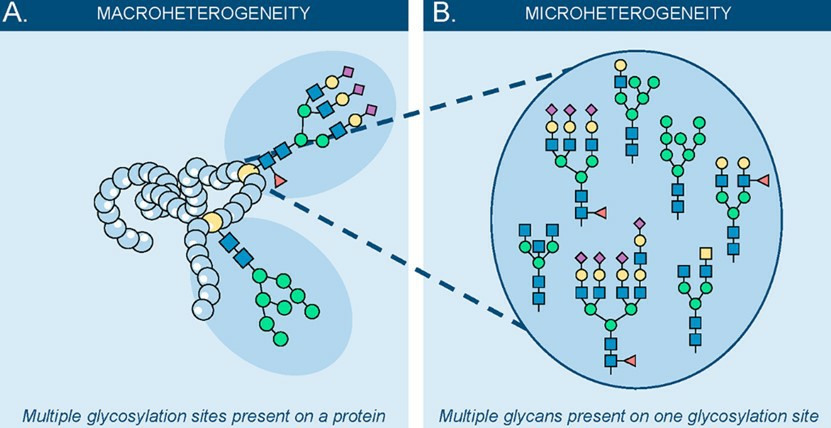Challenges and Relevance of Glycobiology
Glycobiology deals with the nature and role of carbohydrates in biological events. Protein glycosylation is influenced by three main factors: the overall protein conformation, the effect of local conformation, and the available repertoire of glycosylation-processing enzymes for the particular cell type. In general, the pattern of glycoforms is protein-specific, site-specific, and tissue or cell-specific. The finding that glycosylation may vary with the disease also leads to the concept that its manipulation might alter the properties of glycoproteins and result in beneficial therapeutic results. The ability to manipulate and modify sugar structures also provides an important approach in understanding the different functions of oligosaccharides.
Challenges in O-GalNAc-glycobiology
The two most prominent forms of glycosylation events comprise N- and O-linked glycans. Although N-glycosylation always involves the addition of the same core glycan to the amide nitrogen of asparagine (Asn), O-glycosylation comes in several flavors, including intracellular O-GlcNAc modification of nuclear and cytosolic proteins, O-xylose linked glycosaminoglycans, O-mannosylation of dystroglycan, cadherins, and protocadherins, O-fucosylation and O-glucosylation of, for example, Notch receptors, O-galactosylation of collagen, and, then finally, the most abundant and diverse type of O-glycans, the O-GalNAc glycans.
Despite the advances, we still have a rather limited understanding of the largest and most diverse group of O-glycans, the O-GalNAc-glycans, and how they affect cellular functions such as cell signaling, metabolism, or the even more complex immune and neural systems, to name a few. One key question is how to analyze the O-glycoproteome. How many different O-glycan structures exist, wherein the proteome is the individual O-glycans localized, and how do we determine their structure and location on single proteins from individual cells? Once we know the location of the O-glycans, the next question naturally becomes if the O-glycan location and structure change in different cells and upon differentiation, and how a specific O-glycan influences protein function. So apart from developing technologies that allow us to address where the individual O-glycan structures are localized in proteins from individual cells, another obvious challenge is to create model systems that are simple enough to allow dissection of the molecular functions of glycans, but still complex enough to capture the complex and integrative aspects of glycans.
 Fig.1 Macro- and micro-heterogeneity in glycobiology.1
Fig.1 Macro- and micro-heterogeneity in glycobiology.1
Relevance of Glycobiology
-
Carbohydrates can significantly affect protein structure and therefore influence protein function.
-
Many recombinant biopharmaceutical products on the market are glycoproteins, the quality and safety of these products are influenced by the carbohydrate moieties.
-
Recombinant monoclonal antibodies (rmAbs), which have a conserved glycosylation site in the Fc domain of the molecule, are increasingly developed as biotherapeutics to treat rheumatoid arthritis, multiple sclerosis, and other autoimmune diseases.
-
Recent progress in chemical synthesis and bioengineering has resulted in the development of many carbohydrate-based vaccines, some of which have applications in cancer treatment.
-
Heparin, one of the oldest drug agents to date, is a proteoglycan that is still widely used to treat a broad range of conditions.
Custom Services for Glycobiology Research
Creative Biolabs is a comprehensive and leading biology company. We have very senior experts in glycobiology research projects, and our technical staff have accumulated rich project experience. In addition to the customized services, we can also provide a variety of advanced technologies, including but not limited to Lectin Microarray, MS, LC-ESI-MS, MALDI-TOF MS, GC-MS, HPLC, HPAEC-PAD, RP-HPLC, UHPLC/FLD/Q-TOF, FTIR, NMR, SPRi, TLC, Flow Cytometry. If you are interested in our services or technologies, please contact us for more details.
Reference
-
Trbojević-Akmačić, Irena, et al. "High-throughput glycomic methods." Chemical reviews 122.20 (2022): 15865-15913. Distributed under Open Access license CC BY 4.0, without modification.
For Research Use Only.
Resources

 Fig.1 Macro- and micro-heterogeneity in glycobiology.1
Fig.1 Macro- and micro-heterogeneity in glycobiology.1

